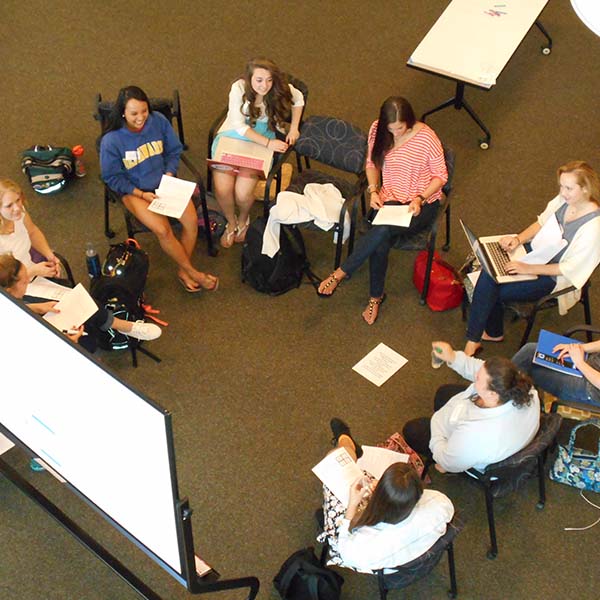“All Voices Count” was an issue in progress before the COVID-19 pandemic hit America, but the value of this issue increases as our country grapples with a fundamental shift in our perspective. Our world reflects voter participation & engagement in every enforced state and federal policy; whether discussing the economy or climate change, it is critical that community members engage in respective and responsive democratic discourse. Civic responsibility fosters strong community participation which, in turn, protects the health and well being of others; AASCU’s American Democracy Project (ADP) collaborates with many campuses, some of which are featured in this issue, to prepare students to be informed and engaged citizens and to foster civic responsibility. This issue illustrates multiple ways for how educational institutions can support our communities in this time of desperate need.
Colleagues Romy Hübler and David Hoffman, University of Maryland, Baltimore County; Craig Berger, Kent State University; Jennifer Domagal-Goldman from All-In Campus Democracy; and Stephanie King from NASPA join their voices to discuss the term “democratic engagement” as they explore how faculty and student affairs educators can use the CLDE Theory of Change to envision new approaches to pedagogy and institutional change. Operationalizing reflection within democratic engagement, for these authors, resulted in creating a Civic Autobiography Tool, a Civic Courage Reflection Tool, and a Meaningful Work Tool, which they describe in this essay. The authors hope that these tools can serve a wider purpose as they encourage other educators to reframe and reinterpret all forms of information.
East Carolina University colleagues Dennis McCunney, Jeremy Tuchmayer, Tara Kermiet, Chris Stansbury, and Erik Kneubuehl present a focused case-study demonstrating how to actively engage students with civil discourse, voter mobilization, and democratic educational initiatives. Their article explores how focused goals, harnessed emotions, consistent programs, an inclusive campus culture, a connection to campus strategic commitments, and a desire to promote safety can result in strong civic and political engagement, opportunities for strategic coalitions, and a broad sense of civic responsibility in higher education.
Western Kentucky University’s Molly Kerby grapples with how institutions can maintain a focus on creating democratically engaged citizens, especially when impacted by state and federal budget cuts. Especially relevant because of our current pandemic climate, she delves into social change theory to show how public problem-solving and project-based learning experiences can result in systemic change.
In response to AASCU’s call that institutes of higher education (IHEs) act as “stewards of place,” Sam Houston State University colleagues Lee M. Miller and Magdalena A. Denham explain how IHEs can partner with state and federal emergency management initiatives to improve community disaster response and recovery action. They note that students gain experience within their field of study and that IHEs themselves are viewed as a positive, contributing actor within the community. During our own present emergency, this article provides many ideas of how IHEs can bolster our community.
Our tribute to Barbara Burch, written by George Mehaffy, David Lee, Molly Kerby, and Paul Markham, explains Burch’s unique ability to inspire and invigorate democratic engagement. Barbara was a true champion of democracy and was one of the founding thinkers in the design of ADP; this tribute stands as a testament to her legacy and the deep respect and love the ADP community has for her.
Our last section demonstrates work done by Dr. Danica Schieber’s students at Sam Houston State University. These focused student papers, written by Taylor Swearingen, Briana Guerrero, and Michael Way, demonstrate an active commitment to community participation and provides a hopeful vision of the kindness that abounds in our communities.
When all voices count, our communities are stronger, healthier, and better positioned to encounter challenges that lie ahead. We hope this issue offers solutions and ideas as we move forward. For more discussions on civic learning and democratic engagement, please register for the Virtual CLDE Meeting on June 4th and 5th, July 24th, and September 11th.
Sincerely,
Felice Nudelman and Cathy Copeland
Authors
 In January of 2019, Nudelman became the new Executive Director of the American Democracy Project (ADP) at the American Association of State Colleges and Universities (AASCU). In 2003, Nudelman had partnered with George Mehaffy and a group of AASCU provosts to create ADP and had remained a thought partner and collaborator as the program grew and developed. Felice has spent the majority of her career in education, both on college campuses and for 12 years with The New York Times Company, where she served as Executive Director of Education. She spent nearly a decade in academic affairs at Bloomfield College, where she served in several capacities including associate dean of academic affairs. She has served as executive director for Pace University’s School of Education, and, from 2011 to 2016, she was Chancellor of Antioch University in Yellow Springs, OH, and then subsequently served Antioch as chief global officer for innovation & partnerships. Prior to assuming her role at AASCU, Nudelman was the Executive Vice President of the Weiss Institute/ Say Yes to Education.
In January of 2019, Nudelman became the new Executive Director of the American Democracy Project (ADP) at the American Association of State Colleges and Universities (AASCU). In 2003, Nudelman had partnered with George Mehaffy and a group of AASCU provosts to create ADP and had remained a thought partner and collaborator as the program grew and developed. Felice has spent the majority of her career in education, both on college campuses and for 12 years with The New York Times Company, where she served as Executive Director of Education. She spent nearly a decade in academic affairs at Bloomfield College, where she served in several capacities including associate dean of academic affairs. She has served as executive director for Pace University’s School of Education, and, from 2011 to 2016, she was Chancellor of Antioch University in Yellow Springs, OH, and then subsequently served Antioch as chief global officer for innovation & partnerships. Prior to assuming her role at AASCU, Nudelman was the Executive Vice President of the Weiss Institute/ Say Yes to Education.
 Catherine Copeland has taught for 10 years within the Writing, Rhetoric, and Technical Communication (WRTC) department at James Madison University. As well as developing and mobilizing “Democracy Counts” as an initiative of JMU President Alger to encourage participation for the 2020 Census, she also teaches interdisciplinary courses for students to apply design thinking to solve complex problems. She co-edits The International Journal of Responsibility and serves as a Faculty Fellow for the Madison Center for Civic Engagement and on the faculty cohort for “Debate Across the Curriculum.”
Catherine Copeland has taught for 10 years within the Writing, Rhetoric, and Technical Communication (WRTC) department at James Madison University. As well as developing and mobilizing “Democracy Counts” as an initiative of JMU President Alger to encourage participation for the 2020 Census, she also teaches interdisciplinary courses for students to apply design thinking to solve complex problems. She co-edits The International Journal of Responsibility and serves as a Faculty Fellow for the Madison Center for Civic Engagement and on the faculty cohort for “Debate Across the Curriculum.”


